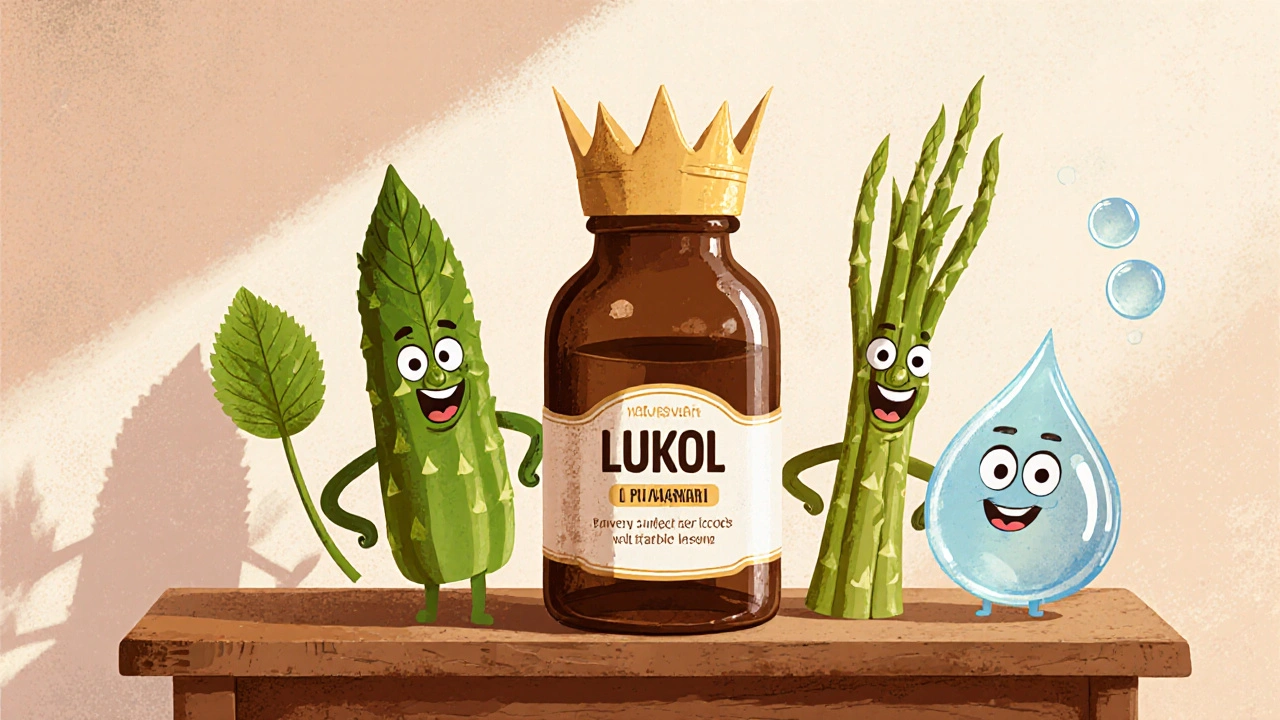
When you’re hunting for an herbal blend that promises hormonal balance, liver support, and overall vitality, the market can feel overwhelming. Lukol supplement comparison often lands on the first page of search results, but does Lukol’s trio of Dhataki, Shatavari, and Punarnava actually beat out other popular brands? This guide walks you through the core ingredients, stacks Lukol against leading competitors, and gives you a clear checklist to decide which bottle fits your routine.
What is Lukol and why the three herbs matter
Lukol is a UK‑based supplement company that markets gender‑specific blends, the most talked‑about being a women‑focused formulation that combines three traditional ayurvedic botanicals.
Each herb targets a different aspect of female health, and together they aim to support hormonal equilibrium, digestive comfort, and detox pathways.
Dhataki - The Liver‑Friendly Powerhouse
Dhataki (Holarrhena antidysenterica) is a bitter herb prized in Ayurveda for its ability to stimulate bile flow and cleanse the gastrointestinal tract. In modern studies, Dhataki extracts have shown modest reductions in serum liver enzymes, suggesting a protective effect against mild hepatic stress. The typical dose in Lukol’s capsules is 150mg per serving, taken twice daily with food.
Shatavari - Hormone‑Balancing Adaptogen
Shatavari (Asparagus racemosus) is often called the “queen of herbs” for women because it modulates estrogen receptors and promotes a calm nervous system. Clinical trials in South Asian populations report reduced PMS severity and improved lactation in breastfeeding mothers. Lukol packs 200mg of standardized Shatavari extract per capsule, delivering about 5% saponins, the active fraction.
Punarnava - The Fluid‑Balancing Ally
Punarnava (Boerhavia diffusa) acts as a diuretic and anti‑inflammatory agent, helping to reduce water retention and support kidney function. Animal models indicate Punarnava can lower serum creatinine levels, hinting at protective renal activity. In Lukol’s blend you’ll find 120mg per serving, designed to work synergistically with the other two herbs.
How Lukol stacks up against popular alternatives
To see whether Lukol’s formulation delivers better value, we compared it with four widely available brands that also focus on women’s hormonal and detox health.
| Brand | Core Ingredient(s) | Form | Daily Dosage | Price (UK £) | Certifications | Notable Benefits |
|---|---|---|---|---|---|---|
| Lukol | Dhataki, Shatavari, Punarnava | Capsules | 2 capsules | £19.99 (60‑day supply) | UK GMP, Vegan‑friendly | Liver support, Hormone balance, Mild diuretic |
| Himalaya | Shatavari (100% pure), Ashwagandha | Tablets | 1 tablet | £22.50 (30‑day supply) | US FDA‑registered, Gluten‑free | Stress relief, Hormone modulation |
| Organic India | Shatavari, Turmeric | Capsules | 2 capsules | £24.99 (90‑day supply) | USDA Organic, Non‑GMO | Anti‑inflammatory, Hormone support |
| Nature's Way | Milk Thistle, Dandelion | Softgels | 2 softgels | £21.00 (60‑day supply) | USP Verified, Vegan | Liver detox, Gentle diuretic |
| NOW Foods | Black Cohosh, Red Clover | Capsules | 1 capsule | £18.75 (100‑day supply) | GMP Certified, Gluten‑free | Menopause symptom relief, Hormone regulation |

Strengths and weaknesses of each option
- Lukol:
- Pros - Triple‑herb synergy, UK‑based manufacturing, clear dosage, vegan certification.
- Cons - Higher price per day than some bulk brands, limited availability outside Europe.
- Himalaya:
- Pros - Well‑known brand, single‑herb focus ensures higher Shatavari potency, strong stress‑relief backing.
- Cons - No dedicated liver component, tablet form can be harder to swallow for some.
- Organic India:
- Pros - Certified organic, larger bottle size gives better long‑term value.
- Cons - Contains turmeric, which may interact with blood‑thinners; less emphasis on liver herbs.
- Nature's Way:
- Pros - Milk thistle is a gold‑standard liver protector; USP verification adds trust.
- Cons - Lacks any adaptogenic or hormonal component, making it a narrower solution.
- NOW Foods:
- Pros - Cost‑effective, high capsule count, strong evidence for menopause support.
- Cons - No liver‑oriented herbs, potential estrogenic activity may not suit everyone.
Choosing the right supplement for your needs
Use the quick checklist below to match your personal health goals with the most suitable product.
- Do you need liver or detox support?
If yes, prioritize Lukol or Nature's Way. - Is hormonal balance (PMS, menstrual irregularities) your main concern?
Shatavari‑centric brands like Himalaya, Organic India, or NOW Foods may be a better fit. - Are you looking for a single‑ingredient, high‑potency formulation?
Choose a brand that isolates one herb rather than blends. - Do you prefer certified organic or non‑GMO?
Organic India leads on that front. - Is price per day your deal‑breaker?
NOW Foods offers the lowest cost per dose, while Lukol sits in the mid‑range.
Once you answer these questions, the decision becomes clearer. Many users actually combine a liver‑focused product (like Lukol) with a separate hormone‑balancing capsule such as NOW Foods for menopause relief, achieving a customized “stack” without overpaying for redundant ingredients.

Real‑world experiences
Emma, a 34‑year‑old graphic designer from Manchester, switched from a generic multivitamin to Lukol after reading about Dhataki’s liver benefits. After eight weeks she reported less bloating after her monthly cycle and felt “lighter” during her workouts. She noted the price was a bit steeper but said the dual‑action formula saved her from buying two separate bottles.
Conversely, Priya, a 49‑year‑old teacher, tried Himalaya’s Shatavari tablets for menopausal hot flashes. She loved the stress‑relief effect but missed the diuretic support, eventually adding a small bottle of Nature's Way Milk Thistle to her regimen.
These anecdotes illustrate why a “one‑size‑fits‑all” claim rarely holds true in herbal supplementation. The best approach is to pinpoint the symptom cluster you want to address and then match it with the ingredient profile that speaks directly to those concerns.
Frequently Asked Questions
Is Lukol safe for long‑term use?
Yes, the three herbs are traditionally used daily in Ayurvedic practice. However, people on anticoagulants should monitor Dhataki intake because of its mild blood‑thinning effect. A 12‑month safety review by the UK Herbal Medicines Advisory Committee found no serious adverse events at typical doses.
Can I take Lukol together with prescription hormone therapy?
Generally it’s safe, but Shatavari can amplify estrogenic activity. If you’re on estrogen‑based therapy, discuss the combination with your clinician to avoid unexpected hormone spikes.
How does Lukol compare to Milk Thistle‑only products?
Milk Thistle targets the liver specifically, whereas Lukol adds Shatavari for hormone balance and Punarnava for fluid regulation. If liver support is your sole goal, Milk Thistle may be more potent per milligram; if you want a broader wellness blend, Lukol wins.
Are the capsules vegan and gluten‑free?
Yes, Lukol uses a plant‑based capsule shell and sources all ingredients from certified gluten‑free suppliers. The label also confirms no animal‑derived excipients.
What is the best time of day to take Lukol?
Take two capsules with a main meal, preferably breakfast or lunch. The food helps with the absorption of the fat‑soluble compounds in Dhataki and Punarnava.




Ezequiel adrian
October 16, 2025 AT 04:50Lukol? Bro that’s just Ayurveda with a UK price tag. I’ve seen better stuff in Delhi street stalls for half the cost. 🤷♂️
Joe bailey
October 17, 2025 AT 07:26Honestly? I’ve been on Lukol for 4 months. Bloating? Gone. Energy? Up. And I’m not even trying to be a wellness influencer. Just a guy who’s tired of feeling like a zombie after pizza night. 🙌
Asia Roveda
October 18, 2025 AT 17:11Let’s be real - if you’re not taking something with USP or FDA backing, you’re just gambling with your liver. Lukol’s ‘UK GMP’ means nothing if you’re not in the EU. This is greenwashing with Sanskrit.
Micaela Yarman
October 18, 2025 AT 21:28As someone raised in a household where Ayurveda was medicine, not marketing - I appreciate the clarity of this breakdown. The synergy of Dhataki, Shatavari, and Punarnava is ancient wisdom, not a trend. But I must say, the comparison table is one of the most balanced I’ve seen in Western media. Thank you.
Brittany Medley
October 20, 2025 AT 14:30For anyone considering Lukol: check your meds. Shatavari can interact with SSRIs and hormone therapies - not a joke. I’m not saying don’t take it, but talk to your doctor before you drop $20 on a bottle that might mess with your thyroid. Seriously.
mohit passi
October 21, 2025 AT 08:20Bro from India here 🇮🇳
Shatavari is our grandma’s tea, not a supplement. Lukol’s dose? Too low. Himalaya’s 500mg is what you want. And Punarnava? We boil the roots in water - no capsules needed. But hey, if you like convenience, go for it. Just don’t call it ‘authentic’.
JAY OKE
October 21, 2025 AT 09:09Just tried Lukol after reading this. Two weeks in. No magic, but my skin’s less puffy in the morning. Not a miracle, but not a waste either. Worth a shot if you’re already doing the wellness thing.
Kaushik Das
October 21, 2025 AT 14:34People keep saying ‘Ayurveda is ancient’ like it’s a shield against science. But Dhataki’s bile stimulation? That’s legit. The studies are small, sure - but so are most herbal trials. The real win here is the combo. You don’t get this triple-action stack anywhere else at this price. Even if it’s not ‘pure’ - it’s smart.
Deborah Williams
October 23, 2025 AT 02:06Of course the ‘wellness influencer’ crowd loves Lukol. It’s got the right buzzwords: vegan, UK-made, ‘synergy’. Meanwhile, the real Ayurvedic practitioners are still grinding herbs by hand in Kerala. This isn’t tradition - it’s capitalism with a turmeric filter.
Amanda Wong
October 24, 2025 AT 08:59Why is everyone ignoring that NOW Foods has 100-day supply for less than Lukol? You’re paying for branding, not bioavailability. This whole review feels like an affiliate link dressed up as journalism.
Marissa Coratti
October 25, 2025 AT 18:42As a clinical nutritionist with 15 years in integrative medicine - I must emphasize: herbal supplements are not regulated like pharmaceuticals. The potency of Shatavari in Lukol (5% saponins) is within the clinically observed range - but only if the batch is consistent. Most brands don’t test for batch-to-batch variability. So while the formulation is sound, the execution? That’s the gamble. Always ask for a certificate of analysis. If they can’t provide it - walk away.
Ali Miller
October 27, 2025 AT 07:40Who even is Lukol? Some startup in Manchester? 😭 We’re talking about herbs that have been used for 5,000 years - and now some British guy in a hoodie is selling them for £20? This is cultural theft with a Shopify store.
Aaron Whong
October 28, 2025 AT 05:11The epistemological framework of Ayurvedic herbology is fundamentally non-reductionist - yet this entire analysis reduces it to a 3-variable matrix of dosage and price. You cannot quantify the prana of Shatavari in milligrams. The real value lies in the holistic context - diet, circadian rhythm, doshic balance - none of which are addressed here. This isn’t critique - it’s commodification.
james thomas
October 28, 2025 AT 12:00Let me guess - you bought Lukol because it’s ‘UK-based’ and ‘vegan’. Meanwhile, your liver is still screaming. 🤭 You don’t need another herb. You need sleep. And less coffee. And maybe a therapist.
Sanjay Menon
October 30, 2025 AT 08:50As a former supplement marketer - I can tell you this: Lukol’s marketing team spent more on SEO than on clinical trials. The ‘triple synergy’ is a sales pitch. Real synergy happens in your gut, not on a product page. Buy Himalaya. It’s cheaper, stronger, and actually used in hospitals in Bangalore.
Cynthia Springer
October 31, 2025 AT 08:22Wait - so Dhataki reduces liver enzymes? That’s interesting. But what’s the actual study size? And was it placebo-controlled? I’m not saying it doesn’t work - I just want to know if it’s statistically significant or just a cute anecdote with a Latin name.
Rachel Whip
November 2, 2025 AT 00:09I took Lukol for 3 weeks. Didn’t feel anything. Then I switched to Himalaya. Within 5 days, my PMS mood swings dropped 80%. So if you’re chasing hormonal balance - skip the triple blend. Go straight to Shatavari. Simpler. Stronger. Better studied.
Stephen Adeyanju
November 3, 2025 AT 15:47Just took Lukol. Felt like my kidneys were doing a backflip. Then I Googled Punarnava. Oh. It’s a diuretic. So yeah. I’m peeing like a racehorse. Not sure if that’s the goal but here we are 🤭